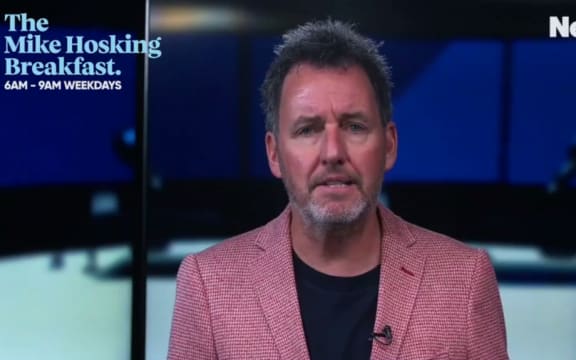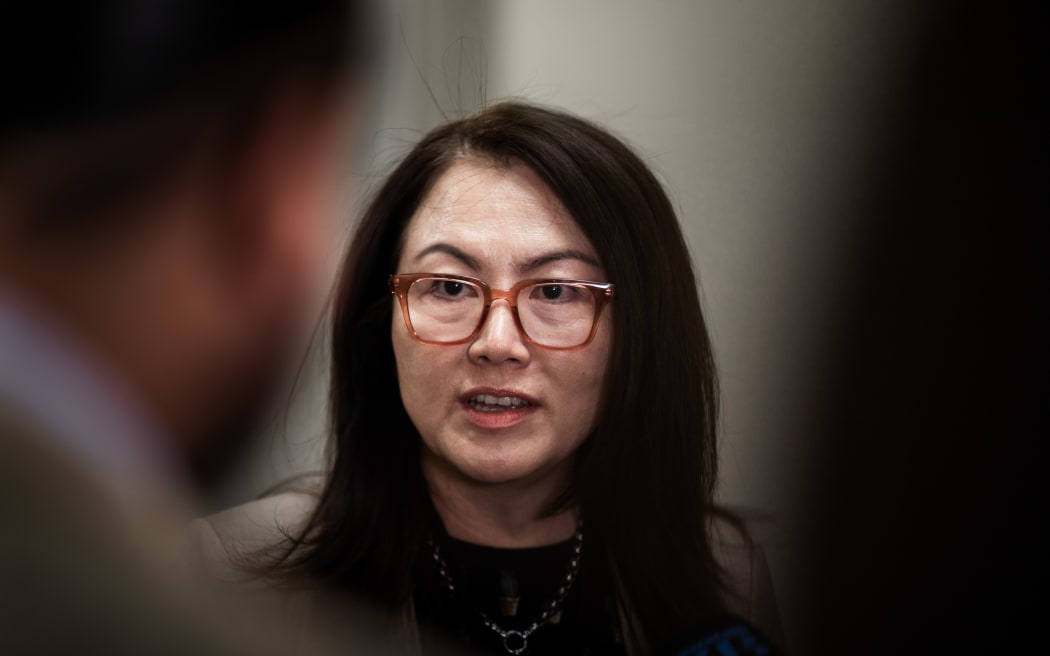
Photo: 123RF
The chief of the country’s most powerful media watchdog says we need new laws now to hold media to account in future. The outgoing government had a plan for one single body to oversee rules for all media, including the internet, but that slow-moving overhaul looks stalled.
What does the Broadcasting Standards Authority want from our new rulers?
This week the Broadcasting Standards Authority (BSA) issued its latest batch of rulings for this year on formal complaints it received earlier in 2023.
It’s an interesting bunch.
The Authority declined to determine one about Country Calendar depicting deer being hunted and shot and processed at an abattoir - just the reality of life in Aotearoa New Zealand, the Authority decided.
It also declined to determine a complaint about undecided people being excluded from TVNZ’s pre- election opinion polls - and one alleging a character described as “effing annoying” in a book review on RNZ's Nine to Noon breached standards for offensive and disturbing content.
(To be clear, “effing annoying” is exactly what was said on air - not the f-word variant itself)
But the Authority did uphold a complaint against Newstalk ZB host Mike Hosking, who told listeners during a teachers strike “people who go on strike have always been on full pay. They’re supported by the unions'”.

Mike Hosking Photo: screenshot / Newstalk ZB
That was “materially inaccurate” and misleading the Authority said - even though some listeners did get in touch afterwards who knew that wasn’t right.
A majority of the Authority also upheld, though only in part, a complaint about a discussion on TVNZ’s Marae show about freedom of expression in the wake of provocateur Posie Parker’s visit to New Zealand.
Rainbow community activist Shaneel Lal had “strayed into the realm of personal attack,” the BSA said - though not all its members considered it a breach of standards.
The BSA also considered a complaint about Mediawatch which was a response to our analysis of another decision made by another media complaints body.
The Media Council had found a Stuff news report about the safety of puberty blockers lacked balance. The BSA found the live Midweek Mediawatch discussion about that was sufficiently balanced and focused on the implications of the decision for journalists and it did not result in unfairness.
A call to action
This week the BSA also used its annual report to call for “urgent and long-overdue reforms to the laws for media regulation.”

Stacey Wood, chief executive of the Broadcasting Standards Authority Photo: supplied
“Increasingly obsolete legislation is making it more difficult to achieve our mission,” said BSA Chief Executive Stacey Wood.
Since 2019 that mission has been “to protect New Zealanders from harm” under a new vision statement: ‘Freedom in Broadcasting without Harm’.
But how is the law preventing the BSA fulfilling it?
Uniquely, the Authority can order errant broadcasters off the air for really bad breaches of the broadcasting codes and even make them apologise. It hardly ever does, but it does make broadcasters pay modest penalties for bad breaches of standards - and acknowledge them on the air.
But while the BSA is backed by the Broadcasting Act of 1989, other media regulators don't have the same power.
The Media Council, for what used to be called ‘print media’; the Advertising Standards Authority for advertisements. Then there’s The Classification Office for other content and publications, overseen by the Chief Censor and separate legislation.
That still leaves whole swathes of online media effectively unregulated. And as broadcasters, newspaper publishers and advertisers all operate on the web these days anyway, having four regulatory agencies that predate the internet does seem out of date.
That was what the Law Commission concluded ten years ago when it recommended a single regulator independent of government. That was prompted by the justice minister back then, Simon Power, warning the internet had become “the Wild West”.
But the subsequent justice minister Judith Collins concluded there was “no crisis of confidence in the mainstream media” forcing the issue - and nothing was done.
Five years ago the Department of Internal Affairs / Te Tari Taiwhenua first proposed one framework for all media with codes of practice enforced by an independent regulator.
There was then some Covid disruption, consultation with broadcasters last year, and then last May a new proposal emerged - Safer Online Services and Media Platforms.
This proposal says media services - including TV and radio - would also need to follow new codes and a new regulator would have the power to penalise serious failures.
Headlines at the time warned of "a new super-power government body set to rule over news and social media content" and one lobby group called it called it “a censor's dream.”
Safer Online Services and Media Platforms noted that news media were a low risk of harbouring harmful content.
Consultation on the proposal ended in July - but when the DIA reports back it will be to a new government - and it will need to be persuaded anew that this is worth doing.
Is that why the BSA went public this week to say that the slow-moving, and possibly even stalled, overhaul is urgent?
“Our annual reports from about 10 years ago make comments about looking forward to the upcoming regulatory reform, and the need for that. We'd finally had consultation this year and it would be a shame if things stalled now,” BSA chief executive Stacey Wood told Mediawatch.
“We saw an opportunity to emphasise again that this is urgent. People are being harmed but traditional broadcasting media is not where most of the harm is happening,” she said.
“One of the goals of the proposed new framework is to reduce fragmentation and increase simplicity and make it easy for people to know where to go. Currently, we've got so many doors if you have a complaint."
“We still think there's a role for a complaints body with oversight of traditional broadcasting media. It could be something like the UK, where OfCom has a lot of new functions relating to the online space.”
“We think there's a role for our expertise, even if it's applied in a slightly different way. It might be that the standards that we've been upholding for the last 34 years are applied at a higher level to new platforms.”
“On social media there's just no effect (from complaints). You need to be holding those online providers to account and saying: 'It's on you’ to make sure people are not being harmed in the first place by the content that appears.”
“We would love to be able to contribute to solving that. But we just have no jurisdiction, and not really any money because levies are going down. We've just had our first government funding increase in 20 years.”
The outgoing government has a Bill before Parliament that proposes the BSA should enforce a bargaining code to get Google and Meta (Facebook) to pay local news media for news hosted on their platforms.

Melissa Lee. Photo: RNZ / Samuel Rillstone
While in opposition, National's spokesperson Melissa Lee said she didn't support it. This week she was named as the new minister of media and communications.
“We still hope that it will be a priority for the new government. The risks now have been highlighted in recent years - mis- and dis-information, foreign interference in elections, self-harm by young people experiencing harmful content online - these are all things (for which) there's been a lot of research done," Wood says.
But we already have the Harmful Digital Communications Act specifically for online bullying - and the Safer Online Services and Media Platforms review has already said news media are ‘low risk’ and broadly responsible.
The BSA’s own just-published annual report bears that out too. Only seven complaints were upheld by the Authority out of 169 complaints considered this year - and three of them were among the latest batch of rulings published this week.
Media other than broadcasters regulate themselves and run their own complaints services and will not want to surrender that.
“We support a co-regulatory system - perhaps similar to what we've got now where the providers of the platforms are responsible in the first instance for the processes and for their codes ... but where there's also a regulator to make sure people are playing by the rules,” Wood says.
There will be resistance from media to what the BSA is proposing. Disclosures made in the course of journalism can end up harming some people - even if they’re in the wider public interest. Pro-free speech lobby groups have already opposed what they see as overreach.
“There's always going to be controversy about limits on free speech. But it's always been recognised that the right to freedom of expression and free speech is never absolute. There's always reasonable limits, especially where it comes into conflict with competing rights,” Wood says.
“There's been a lot of discussion about ‘harm.’ But harm is not ‘being offended.’ Harm means different things to different people - but we don't think that the fact that it's difficult should stop us from trying to prevent it.”
What will happen if the regulatory reform Wood says is really urgent stalls again?
“The Authority will continue to issue robust and useful decisions. But it's going to become more expensive each year to achieve less because we'll be reaching fewer people who are not watching television or listening to the radio. The BSA will continue to issue robust and useful decisions - but we won't be preventing harm to the extent that we have in the past, because increasingly that is not where the harm is occurring.”


